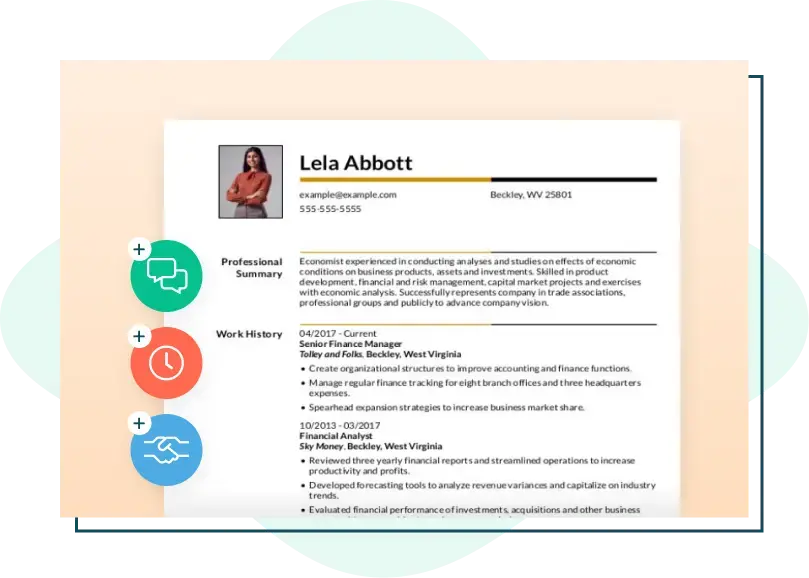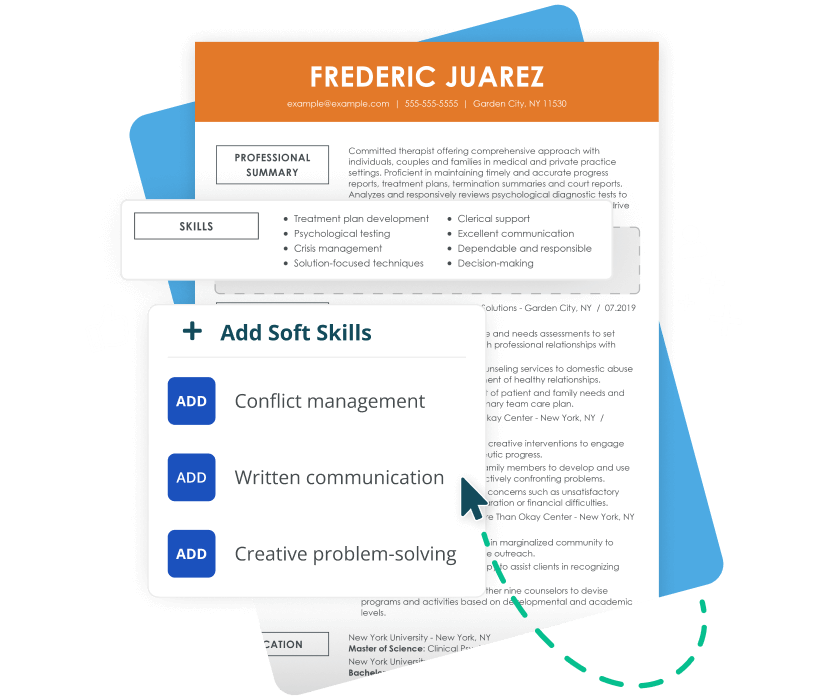- Featured in:
You’ll find soft skills examples, advice on highlighting your skills for resume sections, and access to additional lists of industry-specific soft skills. Use these suggested skills alongside our professionally designed resume templates to help boost your job application and snag those interviews.
What Are Soft Skills?
Soft skills are sometimes referred to as interpersonal skills, social skills, communication skills, people skills or life skills.
These resume soft skills illustrate how you achieve work goals, contribute to the workplace and collaborate. Soft skills can vary from leadership to work ethics to collaboration.
Soft skills vs hard skills
The most effective resumes include soft and hard skills, which are learned skills related to workplace tasks. You’ll include both skill sets across multiple resume sections, including your professional summary, work history and skills sections.
Top Soft Skills Examples
1 Critical-thinking skills
Critical thinking is a soft skill sub-type that refers to how you absorb, interpret and use the information to determine your actions. These soft skills are valuable in the workplace because they help you analyze information collaboratively or make quick decisions during independent projects.
- Observational skills
- Data interpretation
- Problem-solving
- Decision making
2 Teamwork and interpersonal skills
Most workplaces are not solo gigs. Even remote jobs require collaboration over email, video chat or shared documents. Showcasing interpersonal skills on resumes can help hiring managers decide if you’re a potential fit for an existing team. Consider adding soft skills demonstrating the following:
- Teamwork
- Active listening and social awareness
- Negotiation
- Conflict management
3 Communication skills
The previously mentioned skills aren’t possible without strong communication skills. Effective workers need to demonstrate examples of these soft skills on their resumes.
- Verbal communication
- Non-verbal communication
4 Leadership skills
Strong leadership skills can be useful in and out of a managerial role. Practicing these soft skills in collaborative environments can help you practice skills for future promotions and help you maintain effective workplaces.
- Delegation
- Oversight
- Organization
130+ Soft Skills to Boost Your Resume
Employers will look for candidates with industry-specific soft skills when filling an open position. In 2023, resumes are becoming more skilled-focused.
Here is a list we’ve put together of the 130 most in-demand soft skills examples:
Time management
Time management is organizing and balancing our time between activities to achieve goals. Hiring managers prefer candidates with personal time management skills to maximize on-site productivity and minimize work delays.
Examples of solid time management skills include:
- Prioritization
- Meet deadlines
- Calendar management
- Self-motivation
- Focus
- On-time delivery
- Project length estimation
- Goal setting
- Scheduling
- Delegation
- Planning
- Short-term goals
- Long-term goals
Decision-making
Decision-making in the workplace helps determine what can make or break a business opportunity. Featuring these soft skills on your resume can help hiring managers that you can gather information, identify goals and weigh the business consequences in an independent or collaborative setting.
Consider this list of soft decision-making skills:
- Judgment
- Analysis
- Assessment
- Intuition
- Emotional intelligence
- Leadership
- Inclusiveness
- Thoughtfulness
- Weighing calculated risks
- Business forecasting
- Alternative considerations
- Predictive modeling
- Data-driven decisions
Work ethic
Employers look for candidates with solid work ethics because they are trustworthy and reliable. Employees with excellent work ethics stay focused on tasks for as long as necessary to get them done. They also bring honesty and integrity to the workplace.
Related work ethic skills include:
- Motivation
- Trustworthiness
- Responsibility
- Hardworking
- Detail-oriented
- On-time
- Honesty
- Positive attitude
- Task completion
- Exceeding expectations
- Discipline
- Integrity
- Quality craftsmanship
Teamwork
Teamwork is valuable in the workplace to help improve overall efficiency. A positive collaborative workplace can improve morale and motivate coworkers to share ideas and responsibilities.
Practical teamwork soft skills for resumes include:
- Team mentality
- Collaboration
- Cross-functional
- Following instructions
- Communication
- Collective attitude
- Goal-oriented
- Meeting productivity
- Respectfulness
- Accountability
- Rapport building
- Shared responsibility
- Group motivation
- Diplomatic feedback
Creativity
Some hiring managers prefer candidates with creative skills because it encourages innovation and helps drive the business forward. The following creative soft skills might convince hiring managers that you can help unlock new ideas
Creativity soft skills for resumes include:
- Creative solutions
- Brainstorming
- Outside-the-box thinking
- Creative problem-solving
- Imagination
- Visionary
- Unique approaches
- Experimentation
- Lateral thinking
- Open-minded
- Idea generation
- Innovation
- Creative collaborations
- Meeting contribution
Conflict-resolution
Intuitive conflict-resolution skills help improve work harmony and productivity. This skill cultivates stronger work relationships, makes teams function better, and improves work happiness, making you a highly valuable job candidate for most openings.
Related conflict-resolution skills include:
- Diplomacy
- Constructive solutions
- Impartiality
- Interpersonal communication
- De-escalation strategies
- Dispute mitigation
- Listening
- Mediation
- Objectiveness
- Two-sided solutions
- Agreeableness
- Stress reduction
- Emotional awareness
- Cross-functional improvement
Emotional intelligence
Emotional intelligence is managing your emotions to relieve stress, communicate effectively and defuse conflict. These skills enable you to combine all your resume soft skills in the workplace effectively.
Emotional intelligence skills include:
- Empathy
- Compassion
- Social awareness
- Sensitivity
- Social justice
- Reading clients
- Customer service
- Interpersonal skills
- Deep listening
- Mindfulness
- Communication
- Identifying tension
- Emotional support
Critical thinking
This skill involves analyzing complex situations and strategically assembling information. Critical thinking saves companies money, can improve workflow and solve problems.
Consider adding the following necessary critical thinking skills:
- Analysis
- Data selection
- Multi-prong solutions
- Interpretation
- Research
- Inference
- Bias identification
- Reasoning
- Trend recognition
- Data forecasting
- Clear presentation
Interpersonal skills
Interpersonal skills help you cultivate effective workplace communication with individuals and groups. These soft skills allow us to interact and work better with others. Whether you use them in the workplace or personal life, these skills are essential for success and human connection.
Job-relevant interpersonal skills include:
- Active listening
- Dispute resolution
- Written communication
- Oral communication
- Teamwork
- Expressing appreciation
- Positive attitude
- Friendly personality
- Agreeableness
- Collaborative spirit
- Tension reduction
- Team building
- Bonding activities
Empathy
Empathy helps you understand different perspectives to be more patient, predictive and pleasant to the people you work with! Employees value this skill because empathic skills can help build meaningful workplace relationships and genuine connections when working with clients or stakeholders.
Job-relevant empathy skills include:
- Deep listening
- Colleague relationships
- Cultural sensitivity
- Respect building
- Mindfulness
- Body language interpretation
- Interpersonal relations
- Thoughtfulness
- Expressing gratitude
- Generosity
- Rapport creation
Soft Skills FAQ
What are soft skills?
Soft skills are social abilities that enable you to work independently or collaboratively across multiple work settings. This subsection of skills can prove your reliability, quick thinking and culture fit to hiring managers.
There’s a wide range of soft skills. Still, most fall into the following categories:
- Communication
- Emotional intelligence
- Leadership
- Creativity
- Time management
- Teamwork
- Critical thinking
- Management
- Work ethic
Why are soft skills important for specific jobs?
Choosing the right soft skills for specific jobs can help set you apart from other candidates in this competitive job market.
- Culture fit: Prepare in advance by researching the company’s culture. What qualities do the business value? The information you find will define which soft skills you will include in your resume.
- Communication: Strong communication is essential in any role. Recruiters value candidates who can get their points across clearly and concisely. This paves the way to building successful relationships with stakeholders and senior leaders.
- Problem-solving: Interviewers will ask for examples of when you’ve been able to work independently or with the team to solve challenging situations. Prepare examples of your best problem-solving experiences. You can frame these experiences in a problem-action-solution phrase and add them to your summary statement or work history section.
How can I develop soft skills?
Develop your intuitive soft skills inside and outside the workplace. These soft skills impact your success by boosting your productivity and creating a path toward career advancement.
- Take every job or task seriously: No matter how small a responsibility seems, performing it with attention, intention and focus can help you develop and practice critical thinking, attention to detail and work ethic skills.
- Get organized: Organization demonstrates your attention to detail. It also cultivates time management and shows that you are a reliable resource. Avoid clutter and stick to deadlines and timelines. Start using a calendar and set up a daily routine. These habits can help you develop traditional organizational skills.
- Volunteer for projects: Take on personal volunteer projects to practice additional skills on your own time. Working on these community volunteer projects can help you develop communication, teamwork, collaboration and time management skills.
- Ask for advice: Don’t be afraid to ask your manager or teammates. Your unique work experience enables you to develop unique soft skills and perspectives — these insights can help you look and work outside your comfort zone.





